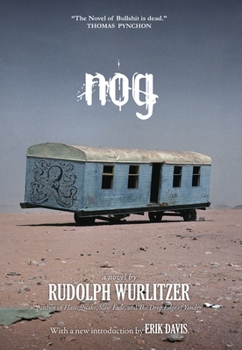Nog
Select Format
Select Condition 
Book Overview
" Nog is to literature what Dylan is to lyrics."--Jack Newfield, The Village Voice "A new kind of American travelogue."--David Ulin, Los Angeles Times Book Review "Somewhere between Psychedelic Superman and Samuel Beckett."-- Newsweek Originally published by Random House in 1969, Nog became a universally revered cult novel and a symbol of the countercultural movement. In Rudolph Wurlitzer's signature hypnotic and haunting voice, Nog tells the tale of a man adrift in the American West, armed with nothing more than his own three pencil-thin memories and an octopus in a bathysphere. This edition of Nog features a new introduction from noted critic and writer Erik Davis ( TechGnosis ). Yesterday afternoon a girl walked by the window and stopped for sea shells. I was wrenched out of two months of calm. Nothing more than that, certainly, nothing ecstatic or even interesting, but very silent and even, as those periods have become for me. Rudolph Wurlitzer is the author of the novels The Drop Edge of Yonder , Quake , Flats , and Slow Fade , as well as the nonfiction memoir Hard Travel to Sacred Places . He wrote the screenplays for such classic films as Pat Garrett and Billy the Kid , Two Lane Blacktop , and Walker , among others, and co-directed the film Candy Mountain with Robert Frank.
Format:Paperback
Language:English
ISBN:0982015127
ISBN13:9780982015124
Release Date:August 2009
Publisher:Two Dollar Radio
Length:168 Pages
Weight:0.43 lbs.
Dimensions:0.6" x 5.1" x 7.4"
Customer Reviews
4 ratings
A Breath Mint For Your Mind
Published by Thriftbooks.com User , 17 years ago
Nog was one of those books that taught me more about writing at the time than all my college courses lumped together. I remember buying this book in its Pocket Books incarnation in the autumn of 1970. The book cost me $.95 cents brand spanking new, but, as they claim on the Master Card commercials, the experience is priceless. I stayed up all night reading the book and raving to my roommates the following morning. One read it; the other demurred. Simply put, it is one of the great classics, not just of an era but in modern American Lit. I still have that original copy of Nog. I handle it with care.
Rudolph Wurlitzer writes an American Classic
Published by Thriftbooks.com User , 18 years ago
After being badgered by the Casa Marina Reading Club in the late '70's to read this (resulting in my subsequent slide into Nog-like obscurity), I can state with some experience that this book exerts an influence on its readers. Rumors abound that Wurlitzer was an itinerant goat herder who strived to simplify his life: to date these rumors are unsubstantiated. However, there is evidence that "Nog" is an influence in the writings of Thomas Pynchon and Christopher Moore. Chuck Norris has been known to quote significant passages from the book in some of his Westerns and credits the book with his zen-like approach to martial arts. A good read - and a way of life.
This book is full of unhealthy mental excitement.
Published by Thriftbooks.com User , 25 years ago
I wish that I could take credit for the "unhealthy ..." quote, but it is attributed to Donald Barthelme from his capsule review which appears on the back cover of my old paperback copy. Writing about Nog, Pynchon proclaimed, "The novel of bull **** is dead." I thought that the book was marvelous. Wurlitzer has a field day with issues of identity, integrity and all sorts of other topics that, as far as I am concerned, were explored in a manner that was much more compelling during the late '60s and early '70s. The notion of a character who invents/chooses his "memories" tickled my fancy then as much as now. Wurlitzer has always been willing to step out into areas where other authors were either afraid or simply unwilling to follow. Try to find the video of "Two Lane Blacktop" if you haven't already seen it. Wurlitzer wrote the screen play and that of "Pat Garrett & Billy the Kid" as well. If unhealthy mental excitement is appealing to you, I would recommend this work highly. If not, save your yourself some upset and read something a bit more tame.
A Surrealistic Existential Nightmare Classic
Published by Thriftbooks.com User , 26 years ago
I may have been one of the first people to read this book. God knows for years I would thrust my tattered copy at friends and insist they read it. My best friend and I still use phrases in conversation that we picked up from the book 20 years ago ("hasten a focus" comes to mind). For some reason I even remember the moment I purchased the book, in paperback, in a Woolworth's back in 1970, mostly because of its "psychedelic" cover art and the promise that "Nog is to literature what Dylan is to music." After a single, futile attempt at reading it, I found it on the shelf in my old bedroom at my parents' house one day in 1974, and noted that a glowing blurb from my favorite author, Thomas Pynchon, graced its back cover. If there is a message in "Nog", it may be: mental illness and hallucinogens are probably not a very good combination. Then again, there's more to "Nog" then meets the eye.





